Interview: Frank Abney paints a vivid picture in ‘Canvas’
Having worked in the industry for years, on some of the biggest projects from Disney, to Pixar, to Dreamworks. Frank Abney has had a phenomenal career, but now he’s not just taking up the animation chair but also, the director’s too! With the release of his new short film Canvas, on Netflix now, Frank Abney writes a beautiful and moving story of love, loss, and reconciliation.
Canvas tells the story of a Grandfather who, after suffering a devastating loss, is sent into a downward spiral and loses his inspiration to create. Years later, he decides to revisit the easel, and pick up the paint brush… but he can’t do it alone.
Produced over the course of five years by a team of artists working after hours across three continents, the film masterfully combines both 2D and 3D animation, with talk of Oscar buzz and new projects since its release. We spoke to Abney to get his thoughts on everything.
You pack a lot of emotion into one very short story. Where did that story originate from? Were there any personal inspirations?
Oh, yeah! It all came from personal places for sure. I started writing the short, probably around six years ago, but it actually began years before that, where I was in a creative rut. Basically, I was making my way through the industry and just trying to find my place in it, and how to get to where I was trying to get. It actually came from my niece, just just thinking about how kids operate in general, they have this carefree nature to how they navigate the world, not really being burdened by the stuff we hold on our shoulders as adults. So that really kind of re-lit the fire in me to create something again. Also watching how my Mom navigated that loss, because I would see these these artistic endeavours here and there. I always wondered “What’s behind that?” and it was through that, and also my grandfather who was always very quiet and kind of withdrawn, I was wondering about the backstory of that as well. So, between all those things, it all contributed to crafting the story.
So, you said it took 6 years, what were some of the biggest challenges you faced with this?
I think time was a big one because I was working full time, all the different films that I was working on. My producer Paige Johnstone was right there with me at Pixar and Dreamworks before that and pretty much all of the team were working as well. So with everyone doing it in their off hours and spare time it was really tough trying to have a rigid schedule to try to finish this thing. For me, it was just a lot of late nights and early mornings. I didn’t have kids going into it. But then, by the time we’re finishing I had two, so it was waiting ’til they went to sleep, then I could go to work.
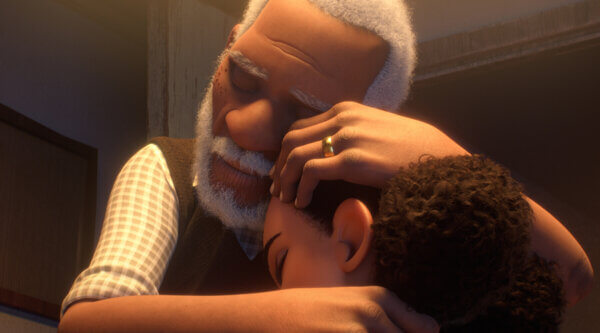
Canvas (Image courtesy of Netflix)
Amazing! And speaking of your experience, you’ve had a phenomenal career across DreamWorks, Pixar and Disney, what were some of the biggest lessons from industry that you were able to apply to when you were making this?
I think the biggest thing, just coming to this as an animator, was the power of subtext and performance; it was more important what the characters were thinking rather than what they were saying. So just wanting to pull that that raw emotion out, just focusing in on the eyes and expression and body language. That was a lot of what I took away from working on this, the story and performance was huge.
Speaking of Pixar, you recently animated on Soul. What was that experience like? Especially with Pixar’s first film with a black leading character.
Oh, that was huge! For me, the moment I found out that Soul had a black lead, I went straight to my department manager and I was like, “I need to get on this film as early as I can”. It meant that I was going to have to skip Toy Story 4 and Onward but it was worth it – I ended up working on both of them eventually, but getting on that film early was huge. Especially with the mark that these big studios have in the industry, and what their audiences mean. We haven’t gotten to see a lead character that look like us. We have some, like Frozone and in newer films with Spiderverse and then even Home, where people of colour are leads, so it’s happening but it’s still really new.
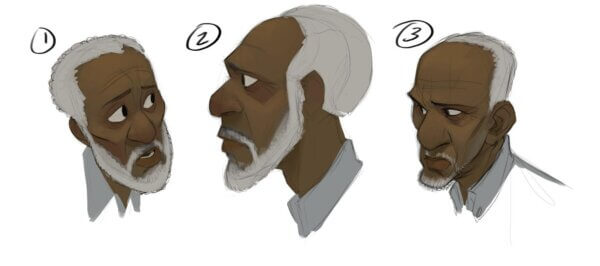
Designs by Randy Bishop (Image courtesy of Netflix)
So you not only write and direct this film, but you also animated on it. How did you balance those multiple responsibilities as well as sharing it with that wider team of people?
Animating on it was definitely a necessity, you know. There were things that I thought would be a nice way of leading by example for the team of animators but it was tough balancing it because we were all working full time. So it’s like, “Okay, well, I’ve got to review these shots, then I have my own shots I have to animate.” Trying to juggle, “Okay, maybe if I review people’s shots during the day, then I’ll work on my shots late at night.” I eventually found a groove but yeah, it took a little bit of trying to work that out and make sure the quality was there as well.
Yeah, and it really shows because the quality is really there! The art style is so wonderful, especially the mixing of the 2D and 3D scenes. What made you choose to do the scenes in 2D?
I work in 3D and that’s what I’ve been doing for 13/14 years, so that was a no-brainer, but 2D animation really got me into wanting to pursue this career, so I knew I had to pay respect to that because of the magic that sucked me in as a kid. For the sequences in Canvas that are more magical I felt like that was the logical choice, to use 2D animation to bring those to life, just to have fun. Something that was more directly tied to an artist’s hand.
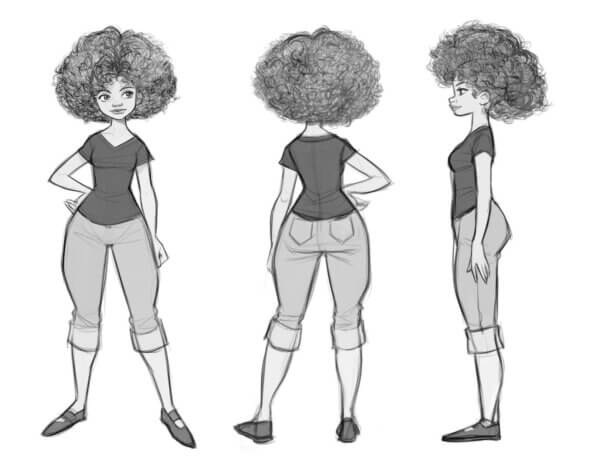
Character designs by TB Choi (Image courtesy of Netflix)
When did Netflix get involved? And what was the process like working with them?
They reached out probably two years ago, when I initially posted the characters and some of the 3D models that were works-in-progress of the characters. I shared them on Twitter and Instagram and I got a message just congratulating me, but also, the notion that this is something that that they really should get behind and support. I just kept in touch since then, so they knew how it was going, and when it came to finishing time, they were right there.
Are you keen to work with them again? Do you have any future projects in the pipeline?
I can’t talk too much about the project, but I am directing an animated feature with them. It’s gonna be another special one. It’s something that I can really identify with and put myself into.
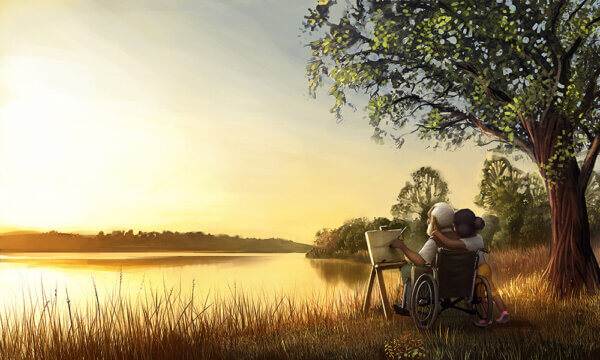
Art by Marco Furtado (Image courtesy of Netflix)
Earlier this year, I interviewed the creators of JoJo and Gran Gran and they spoke eloquently about the importance of grandparents, especially in the black household. Were there any of those personal, cultural influences that you felt were really important to highlight? Obviously, you took a lot of personal inspiration yourself, but did you kind of feel you need to put that at the forefront when you were writing the story?
Yeah, I mean, it’s one thing having having a black family to put out there, which was important. But also, within that, we hardly see any protagonists who are grandparents, the main characters are usually these younger characters that most of the youth and adults can identify with. Having centering on a grandfather was something that I hadn’t seen a whole lot of, but it was something that I thought would be really interesting, and also something that I thought would be interesting to dig into on the mental side, because of someone having this love with them over the years – then, all of a sudden, they’re gone. How do you deal with that, later in age, when you have this person with you for most of your life?
I’m also just thinking about my own grandfather, there’s a lot of stuff that as kids, you don’t know about your grandparents and so how I structured it in Canvas is I have a little girl, her name is Laura, she stays with her grandfather every day while her mom goes to work, and they have their time together. And all this time that goes by, she’s wandering about this room that’s been off to the side, but it’s one of those things, growing up, there are some things that were just off limits, and whether it was that living room that no one goes in, or, or you have to sit in a certain room. And with this, it was one of those things, where, to learn a little bit more about her grandfather, and also just pointing to the black community, I feel like with a lot of these tragedies that happen, sometimes there’s such a frequency, we don’t really have time to take the time to deal with that grief, and to process it. And so I wanted to get that idea into Canvas as well with how, this loss of his wife has forced him to just basically lock all this stuff away and not deal with it, he just had to put it away and just move on.
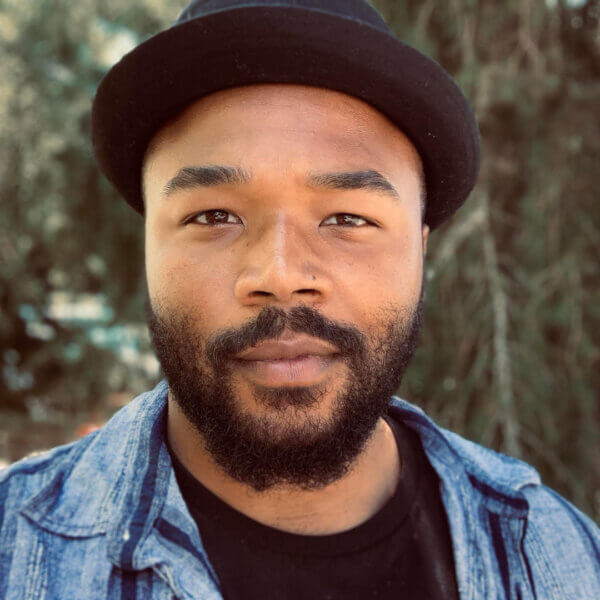
Frank Abney (Image courtesy of Netflix)
I also want to talk about Rise Up Animation, as that was something that you co-founded. Could you tell us about what that is for people who may not know?
Rise Up Animation was basically our way of bridging that gap to Hollywood. For a lot of us, wherever we live in the world, this industry still seems so far away. So I wanted to bring that a little closer to people of colour that are trying to get into the industry, because it’s very low numbers in terms of the statistics. We don’t know what those reasons are, but at least with this we can try to help in some way with what we provide, which is feedback sessions for all that need it, whether it’s animation feedback, 3D modelling, character design, visual development, resume advice or just basic industry advice to find those ways to help connect people with industry professionals. We can’t promise jobs but we can help get them in the right direction to do it.
What’s the response to Canvas been like since it was released?
I’d say from when we first made that post announcing it, it just blew up. I don’t even know the numbers, it was pretty overwhelming. But the great part of that was that there were so many people from the industry that came forward and asked me how they can help, so with hundreds and thousands of mentees coming up, we had mentors to answer that call. It’s still growing, it’s gotten to a point where we’re looking at other avenues where we can help, whether it’s scholarships, or donating hardware, stuff like that. I know with how big it’s gotten, that’s just more of the representation that’s needed to bring into the industry.
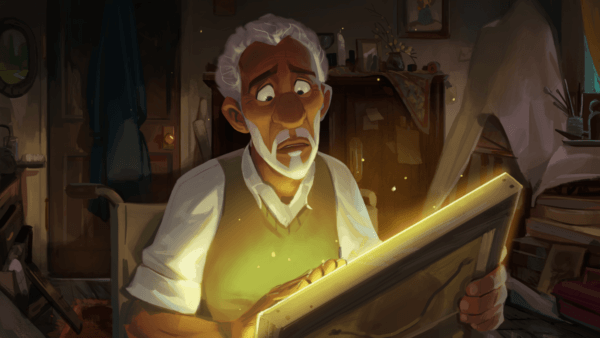
Art by Brandon Wu (Image courtesy of Netflix)
What would be one thing your audiences can take away from watching Canvas?
If it was one thing I’d say, with the many injustices and tragedies and traumas that we have to go through in this life, it’s the understanding that we don’t have to go through it alone.
Canvas is out now on Netflix

